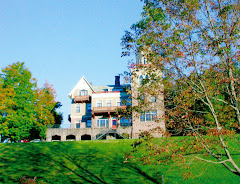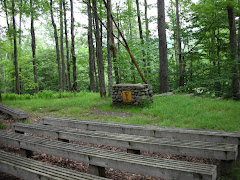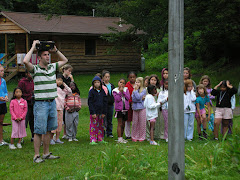Here are the program notes I wrote for the induction of Carl & Marie Hess into the Frost Valley Hall of Fame:
*
By 1968 Carl & Marie Hess had come of age, had met and
married, had raised a child, and had developed a local reputation for stalwart
good work—in the Pine Barrens of South Jersey, a region whose traditions of
unpretentious striving they embodied and to which they felt deep
devotion. But
that year they made a big unlikely decision—to move to and live at a camp in
New York State, where, at that point, only one other family resided year round
(for even the Executive Director who hired them, D. Halbe Brown, spent most of
the year in New Jersey where he ran the camp's business office). The move to
this unproven place, where everything needed at least a little improvement, was
very much like pioneering. Carl and Marie did indeed work like pioneers. The
many hundreds with whom they worked in the coming years and decades, and the
tens of thousands who as weekend guests, teachers and schoolchildren, and
summertime camper and counselors, were awed by their relentless effort, their
integrity, and their capacity for helping others without the need ever of
sermonizing about which core Frost Valley value they were demonstrating. Carl
and Marie Hess proved the worth of these values every time they acted.
Their complete honesty, enormous sense of responsibility, great
respect for others (especially
those who, no matter how different from them,
were willing to work hard for the children), and intense feeling for
stewardship of the beautiful property they had come to call home: these were
the traits evinced by Carl and Marie, as they helped to establish a real belief
at Frost Valley, shared by the entire staff, that (as John Giannotti once put
it) "we weren't going to be part of any ordinary camp"—that we need only
follow the way “these two people just knew instinctively how and when to apply
their magical, unrelenting support" and thus could learn for ourselves how
to accomplish what often in those days seemed an impossible task.
Indeed, their first decade here—until Carl's untimely death
by cancer in the late 1970s—was an epoch of extraordinary, unanticipated
growth. Somehow Carl and Marie kept pace, and thrived. Summer camp added 8 Sequoia
tents, a large new Adventure Trip program, three new villages for teens, increased
seasonal staff to more than 200, and sometimes fed nearly 900 people at a time
in two dining halls. Busy conference weekends (with the addition of
cross-country skiers) and the new and growing Environmental Education program
brought annual totals of guests and campers served from a few thousand to
25,000 annually. Thousands of acres were added to the site. There were more fields
to mow, more meals to prepare, more dishes to wash, more garbage bins to empty,
more vehicles to repair, more laundry to clean, more cheeseburgers and root
beer floats at Staff Lounge to serve late in to the night. Carl worked six and
sometimes seven days each week as director of the camp's small maintenance
crew. Marie worked in the kitchen between September and April, then both
kitchen and housekeeping (with just one other person) in May and June, and then
in the summers directed the perpetual cycle of camper laundry by day and the Staff Lounge in Pigeon Lodge until
after 11 PM at night.
To this expansion they brought their continued commitment to
the abiding values they loved: no matter the increasing numbers, every one at
Frost Valley deserved their attention; if they could fix your problem, they
would, no matter how far out of their way they had to go. Our inductees ever
and always—be it weekday or weekend, dawn or midnight—went the extra mile, and,
remarkably, this was often the literal fact: to jump a guest's car that had
broken down in a blizzard halfway to Liberty; to deliver a laundered beloved
teddy bear personally in the dining hall to calm the nerves of a 10-year-old
camper who had never slept a night without it.
"They had a heart for mentoring young people and
creating a team effort," wrote Jeff and Wendy Brown. "Hessie and Carl
played a big part in my life," remembers Peggy Hope. "There was
nothing they couldn't do. They were the great pioneers of Frost Valley,
instrumental in creating a unique, nurturing, accepting and educational place
where anyone, through effort, could experience it as home." "Marie
and Carl promised to watch out for me," Kathy King Steinwedel recalls of
her first summer on staff at 14, "and I always knew it. I learned that
summer to work hard always. To be kind and generous. To be a little silly. To
fold mounds of laundry as fast as possible!"
After losing Carl, Marie redoubled her work ethic, as if she
were now and forever going to do enough good for Frost Valley for the both of
them. She remained on the staff for many years, and then, after retirement,
returned each summer for at least a month—still, as Rhonda McNamara put it at
the time of Marie's death this past year, "the hardest working woman I
have ever met and a role model to us all." Maureen Health Kosa speaks for
many when she describes them as offering an example of principled adulthood: "I
know that Hessie was the rock for so many of us at our home away from home. Her
strength was an inspiration for me as a shaky adolescent, during a tumultuous
era, who was trying to become independent and didn't know how. I hear her voice
in my head, and smile."
Today we posthumously induct Carl & Marie Hess into the
Frost Valley Hall of Fame, for their willingness and capacity to go the
generous extra mile to help colleagues, friends and strangers alike; for their
unyielding belief that no job in support of children and families was too small
or too messy; for their 24/7/365 faith that Frost Valley’s vision would always
be discerned in the details.














